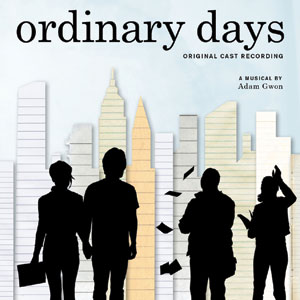
Image credit: Fresno Beehive
[Spoiler alert: if you are fortunate enough to have the opportunity of attending Ordinary Days, know that the following describes much of the play’s ending.]
Manalive, the novel by G.K. Chesterton, opens with miraculous gust of wind, a meterological phenomenon described as “the good wind that blows nobody harm.” I always found something particularly memorable about that image of a moment of impossible happiness, and it gusted into my mind once more when I attended the recent Austin production of the chamber musical, Ordinary Days.
Ordinary Days offers more than a miraculous gust of wind. Instead, its climax brings all four of the play’s cast members into contact by a single, bizarre spectacle. The image is explicitly identified not with nature, however, but with one of the greatest recent tragedies of our nation: the destruction of the World Trade Center on September 11. I’m not sure that the play’s treatment of 9/11 is necessarily its most brilliant moment—but it does offer an interesting example of one artist’s attempt to use visual and narrative imagination to recontextualize the image that has driven so much of America’s foreign and domestic policy over the last ten years.
The play starts off, it seems, as about as unpolitical as a story could. Jason is moving in with his girlfriend Claire, wondering whether he can find a place for himself in her apartment and heart. Meanwhile, cheerfully optimistic (if profoundly unambitious) artist Warren finds the dissertation notes of neurotic grad-student (but I repeat myself) Deb, starting a delightful odd-couple friendship. Everyone, naturally, has his or her own problem. Claire struggles to clean out the clutter of her past in order to make room for Jason. Deb is still running away from her childhood in “like, a suburb of a suburb,” but finding that the overwhelming anonymity of New York (not to mention the inflexibility of her dissertation advisor) don’t live up to her big-town imagination. The male characters are simpler: Jason yearns to move forward in his relationship with Claire, while Warren finds a simple pleasure in trying (mostly unsuccessfully) to hand out flyers covered with motivational sayings.

Warren and Deb. Ahh, what delicious awkwardness. Image credit: Kimberly Mead
The events on 9/11 are evoked near the end of the musical, after Claire rejected Jason’s marriage proposal. Deb and Warren are contemplating the city from a friend’s high-rise apartment, contemplating their insignificance, the fact that they will “never stand as tall as these buildings.” On a whim, Warren decides to cast his flyers to the street below. Reeling from a disastrous meeting with her dissertation advisor, Deb adds pages from her dissertation to the impromptu confetti. New Yorkers gather, with quite understandable anxiety to see their day disrupted by a sight no one could have predicted. Walking beneath the paper explosion, Claire sees “this storm cloud of papers fall down from the sky,” triggering her (and the audience) to re-live her own traumatic memories. Claire calls Jason and, in perhaps the show’s most powerful number, recounts her whirlwind romance with her first husband. This love story ended, as so many stories did, on September 11, 2001.

Image credit: Kimberly Mead
The reaction to 9/11 involved many responses: anger, fear, the sort of “quiet, unyielding anger” that I shared with George W. Bush and that lead us to two perhaps ill-advised wars, unimaginable abridgment of our civil liberties, and a drone program where Americans and foreigners are systematically killed with very little in the way of due process or civilian oversight. But Ordinary Days, for a moment, brought out other memories of the day: the sense of helplessness, the sense that everything has changed, the sense of horrified vertigo of looking up, and feeling like the bottom of my life had dropped out.
There is something appropriate, then, to seeing two characters throw their obsessions out the window of a skyscraper. If Ordinary Days is, as Warren puts it, “an almost, not-quite, New York sort of fairy-tale,” the scene functions as a through-the-looking-glass echo of the disaster that inspired it. Yes, Deb and Warren see their plans, their imagined careers, and much of their identities swirl away. Yet watching words drift to the ground like shards of glass and steel, Claire hallucinates her previous husband’s voice: “hey, you’re allowed to move on. It’s okay.” That is all the permission she needs to accept Jason’s proposal, and accept the hopeful ending we want from our musicals. But maybe, just perhaps, Ordinary Days offers a way of simultaneously recognizing the events of our recent history, and developing a healthier reaction to the tragedy. Maybe then we can cross, as Jason sings in the play’s third song, “all this space between / the moment we’re in and what’s lying ahead.”

Recent comments
2 years 29 weeks ago
2 years 44 weeks ago
2 years 44 weeks ago
2 years 50 weeks ago
3 years 4 weeks ago
3 years 4 weeks ago
3 years 4 weeks ago
3 years 6 weeks ago
3 years 6 weeks ago
3 years 6 weeks ago